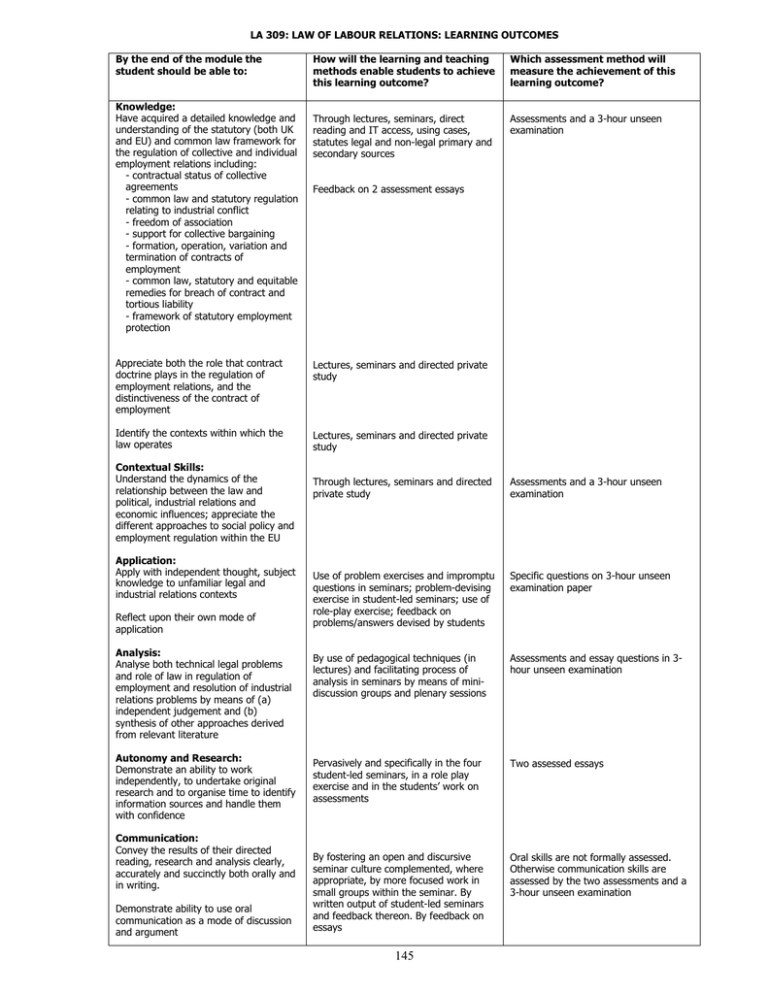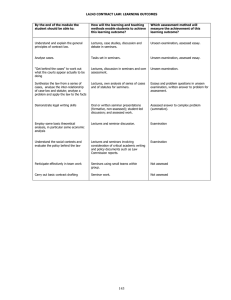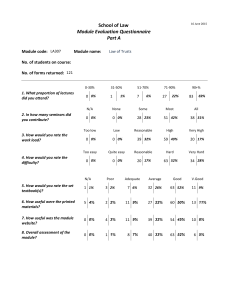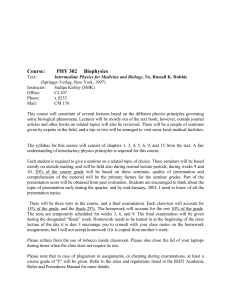LA 309: LAW OF LABOUR RELATIONS: LEARNING OUTCOMES
advertisement

LA 309: LAW OF LABOUR RELATIONS: LEARNING OUTCOMES By the end of the module the student should be able to: Knowledge: Have acquired a detailed knowledge and understanding of the statutory (both UK and EU) and common law framework for the regulation of collective and individual employment relations including: - contractual status of collective agreements - common law and statutory regulation relating to industrial conflict - freedom of association - support for collective bargaining - formation, operation, variation and termination of contracts of employment - common law, statutory and equitable remedies for breach of contract and tortious liability - framework of statutory employment protection How will the learning and teaching methods enable students to achieve this learning outcome? Which assessment method will measure the achievement of this learning outcome? Through lectures, seminars, direct reading and IT access, using cases, statutes legal and non-legal primary and secondary sources Assessments and a 3-hour unseen examination Feedback on 2 assessment essays Appreciate both the role that contract doctrine plays in the regulation of employment relations, and the distinctiveness of the contract of employment Lectures, seminars and directed private study Identify the contexts within which the law operates Lectures, seminars and directed private study Contextual Skills: Understand the dynamics of the relationship between the law and political, industrial relations and economic influences; appreciate the different approaches to social policy and employment regulation within the EU Application: Apply with independent thought, subject knowledge to unfamiliar legal and industrial relations contexts Reflect upon their own mode of application Analysis: Analyse both technical legal problems and role of law in regulation of employment and resolution of industrial relations problems by means of (a) independent judgement and (b) synthesis of other approaches derived from relevant literature Autonomy and Research: Demonstrate an ability to work independently, to undertake original research and to organise time to identify information sources and handle them with confidence Communication: Convey the results of their directed reading, research and analysis clearly, accurately and succinctly both orally and in writing. Demonstrate ability to use oral communication as a mode of discussion and argument Through lectures, seminars and directed private study Assessments and a 3-hour unseen examination Use of problem exercises and impromptu questions in seminars; problem-devising exercise in student-led seminars; use of role-play exercise; feedback on problems/answers devised by students Specific questions on 3-hour unseen examination paper By use of pedagogical techniques (in lectures) and facilitating process of analysis in seminars by means of minidiscussion groups and plenary sessions Assessments and essay questions in 3hour unseen examination Pervasively and specifically in the four student-led seminars, in a role play exercise and in the students’ work on assessments Two assessed essays By fostering an open and discursive seminar culture complemented, where appropriate, by more focused work in small groups within the seminar. By written output of student-led seminars and feedback thereon. By feedback on essays Oral skills are not formally assessed. Otherwise communication skills are assessed by the two assessments and a 3-hour unseen examination 145 LA 309: LAW OF LABOUR RELATIONS: LEARNING OUTCOMES (contd) By the end of the module the student should be able to: Knowledge: Have acquired a detailed knowledge and understanding of a statutory (both UK and EU) and common law framework for the regulation of collection and individual employment relations including: - contractual status of collective agreements - common law and statutory regulation relating to industrial conflict - freedom of association - support for collective bargaining - formation, operation, variation and termination of contracts of employment - common law, statutory and equitable remedies for breach of contract and tortious liability - framework of statutory employment protection How will the learning and teaching methods enable students to achieve this learning outcome? Which assessment method will measure the achievement of this learning outcome? Through lectures, seminars, direct reading and IT access, using cases, statutes legal and non-legal primary and secondary sources Assessments and a 3-hour unseen examination Feedback on 2 assessment essays Appreciate both the role that contract doctrine plays in the regulation of employment relations, and the distinctiveness of the contract of employment Lectures, seminars and directed private study Identify the contexts within which the law operates Lectures, seminars and directed private study Contextual Skills: Understand the dynamics of the relationship between the law and political, industrial relations and economic influences; appreciate the different approaches to social policy and employment regulation within the EU Application: Apply with independent thought, subject knowledge to unfamiliar legal and industrial relations contexts Reflect upon their own mode of application Analysis: Analyse both technical legal problems and role of law in regulation of employment and resolution of industrial relations problems by means of(a) independent judgement and (b) synthesis of other approaches derived from relevant literature Autonomy and Research: Demonstrate an ability to work independently, to undertake original research and to organise time to identify information sources and handle them with confidence Communication: Convey the results of their directed reading, research and analysis clearly, accurately and succinctly both orally and in writing. Demonstrate ability to use oral communication as a mode of discussion and argument Through lectures, seminars and directed private study Assessments and a 3-hour unseen examination Use of problem exercises and impromptu questions in seminars; problem-devising exercise in student-led seminars; use of role-play exercise; feedback on problems/answers devised by students Specific questions on 3-hour unseen examination paper By use of pedagogical techniques (in lectures) and facilitating process of analysis in seminars by means of minidiscussion groups and plenary sessions Assessments and essay questions in 3hour unseen examination Pervasively and specifically in the four student-led seminars, in a role play exercise and in the students’ work on assessments Two assessed essays By fostering an open and discursive seminar culture complemented, where appropriate, by more focused work in small groups within the seminar. By written output of student-led seminars and feedback thereon. By feedback on essays Oral skills are not formally assessed. Otherwise communication skills are assessed by the two assessments and a 3-hour unseen examination 146 LA 309: LAW OF LABOUR RELATIONS: LEARNING OUTCOMES (contd) By the end of the module the student should be able to: Other Skills/Group Work: Work collaboratively, allocate responsibility within a group and complete a defined task within a specified time-frame IT: to present a word-processed essay or comparable work completed to an appropriate standard; use the internet and electronic databases to access information How will the learning and teaching methods enable students to achieve this learning outcome? Which assessment method will measure the achievement of this learning outcome? Use of student-led seminars Collective short answers/papers to student-led seminar tasks (no degree credit) Referring students to relevant web sites; encouraging students to see the use of IT as an essential research tool both for seminars and assessed work Not directly assessed, although one aspect of the criteria for grading assessment is ‘evidence of independent research’ 147



